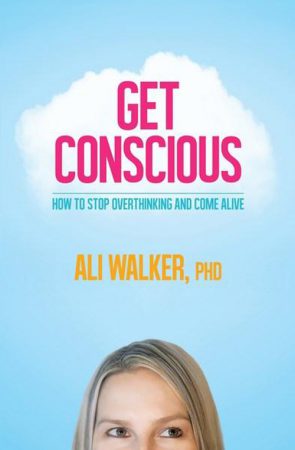As a lifelong chronic overthinker (psychiatrists and psychologists call it “ruminating”), Dr Ali Walker*’s new book Get Conscious – How To Stop Overthinking and Come Alive, published by Hay House Australia, lit up the radar for me. I’ve spent so much time overthinking rubbish that it’s left too little room for the new and more important. I thought it was worth sharing some insights from her book as overthinking is, in my observation, an epidemic, holding people back in their life and work.
In ancient times, most people believed that if you travelled to the horizon, you would fall over the edge.
This was a mirage that limited their lives. Today, the mirage that we all live by is the idea that:
I will be happy when I am married!
I will be happy when I leave my job!
I will be happy when I am on holidays!
This belief leads to us overthinking and over-analysing all the ways that we might be happier at some point in the future.
But what if happiness is the wrong aim? What if happiness is like the horizon: an imaginary line that seems real until we start to chase it?
Instead of seeking happiness in the future, we can focus on awareness in each moment, training ourselves to generate calming, positive and uplifting thoughts and emotions.
When my beautiful grandpa was alive, he often told me the story of his friend, the lawyer. This lawyer was very successful. Like many people, he believed that happiness would be the result of hard work and the wealth that came along with it.
He was determined to climb the ladder in his profession. He started as a paralegal, while he was studying law.

After graduating, he spent some years as a lawyer. Then he left the firm to become a barrister (an expert litigator).
He enjoyed success as a barrister for many years and was eventually appointed as a Queen’s Counsel (QC), an elite group of barristers chosen by the Government.
After several years as a QC, he became a judge. He spent over a decade as a judge and over the years became very wealthy.
After he had retired, he was talking one day to my grandpa. He lamented that, despite his hard work and external success, he never felt as if he had “made it”.
He was searching for something in his success, but had never found it. He always thought he would discover happiness in his next achievement or in the next phase of his life.
His final reflection was: “You never arrive”.
Research tells us that his story is universal. When we look for happiness in the future: in our money, in our stuff, in the chase or in the thrill of the deal, we never arrive.
In fact, a study by economists from Princeton University in 2010 showed that, once we earn an average annual income, our happiness does not increase by earning more money.
This means that if we are comfortable financially and our needs are met, more money does not increase our life satisfaction.

Another famous study in 1978 by Northwestern University [Chicago] and the University of Massachusetts reported that, when people experience unexpected luck (like winning the lottery) or unexpected tragedy (like a catastrophic car accident), their level of happiness eventually returned to the same level it was prior to the event.
The truth is, while most of us feel “happy” for some part of each day, achieving happiness in life can be like chasing the horizon.
It is always there in moments when we have a higher perspective and yet, when we chase after it and try to catch it, it disappears into thin air. It is always just out of reach – our modern mirage.
So if happiness is not in money, luck or the future, where is it? Where is that purposeful, on track, meaningful, satisfied, joyful feeling of “arriving” that we are all searching for?
I have been researching this question for several years, and here is what I’ve discovered:
Our brains can’t make us happy: The human brain, left to its own devices, is unable to make us happy. It is simply a signalling machine that is built to keep us alive and avoid pain. That’s it.
Most of us are just living according to the programs of our childhood that were installed by our genetics and environment.
I call them “someone like me” programs. For example:
- This is how much money someone like me earns.
- This is the kind of relationship someone like me deserves.
- This is the job someone like me performs.
- This is when someone like me gets married and has children.
Who is “someone like me”? Someone from my family, my community, my age, my gender and my country. If you’re not happy and living to your highest potential, it’s because your brain is running your life based on the programs of your past, and the people around you
Life is a series of tiny choices: We have been conditioned to believe that our life and our happiness are defined by our big choices: where we live, our career path, our life partner.
In actual fact, our life and our happiness are defined by the tiny choices that we make in each moment about how to think and feel.
These tiny choices create momentum; they create a trajectory, as though we are constructing train tracks, and each thought or emotion we have places another track in front of us.
It doesn’t feel like a big deal to us at the time, but each new track determines our ultimate path and direction.
To live a life that brings us happiness, we must go beyond our brain and live from a different place: our consciousness.
Put simply, consciousness is the mind’s capacity to direct our awareness and attention.
Just like the airport has a control tower that watches and co-ordinates all of the flights, our mind has a control tower that can watch and co-ordinate our thoughts, emotions and behaviour.
We just need to find the way into the control tower of our mind. We do this by developing our conscious awareness.
When we are aware of our patterns, our stories, our habits and our desires, we have the power to change them. We have the power to be intentional and perceptive about our life choices.
Drawing on my research in psychology and my work with clients, happiness comes from practising four steps every day.
If you practise conscious awareness, your outside life will flourish. You will succeed. You will be abundant. You will be surrounded by love. You will arrive. And you will reach the edge of the world.
So here’s my message: Don’t try to be happy, try to be conscious. This will make you happy!
HOW TO STOP OVERTHINKING AND GET CONSCIOUS
In every moment, we have four choices: how to feel, how to think, how to sense and how to act. Here are four steps to enhance your conscious awareness:
Step 1: Feel and honour all of your emotions.
Step 2: Think and choose only positive thoughts and learn how to direct your brain.
Step 3: Sense and trust your senses and the messages of your body.
Step 4: Act and work with the flow of life and love.
- Dr Ali Walker is a social researcher at the Centre for Social Impact, University of NSW (UNSW) Sydney. Her work focuses on the question: What conditions lead to personal and social nourishing? Ali has a weekly radio segment, Conscious Living, on Radio 2UE Sydney’s Talking Lifestyle and speaks regularly for companies, organisations, schools and on radio shows nationally. Ali spent several years researching consciousness, social change, and law, with a doctorate from the Australian National University. In addition to her PhD, Ali has a Masters degree in International Law and International Relations and two undergraduate degrees in Law and Arts from UNSW Sydney. She lives in Sydney with her husband and two sons. DRAWALKER.COM.AU
10 SIGNS YOU’RE A CHRONIC OVERTHINKER
“When you break up with over-thinking it’s like writing your own `get out of jail free’ card,” says wellness blogger Peggy Nolan, published on The Huffington Post.
She describes the classic signs:
- A problem will keep any problem a problem, which will keep you stuck inside the same problem until you quit thinking about it.
- A situation will make the situation worse in direct proportion to the time and energy you spend overthinking it.
- Overthinking is anything that prevents your creative problem solving skills from bubbling up.
- Worry is nothing more than your imagination concocting a negative future state.
- Overthinking is a time suck – you’re so busy in a negative future state or negative past situation (which you can’t change) that you completely forget about right here right now.
- It robs you of energy that could be better focused on things that are worthy of your attention.
- It leads you to second-guessing yourself and creates self-doubt.
- Overthinking is a drama that occurs on a stage, inside your head, where you are the director, producer, actor/actress/supporting cast, key grip, sound manager, and executive assistant to the executive assistant of the casting director.
- It fabricates problems and “what if” horror stories.
- Overthinking creates heightened feelings of anger, resentment, jealousy, fear, doubt, indecision, confusion, etc; as if whatever you are over-thinking is happening in real life.
“It doesn’t cost you anything to end your relationship with the drama inside your head. You can decide to focus on things in the present that are deserving of your time and attention whenever you choose.
“The here and now is calling … will you answer?”




